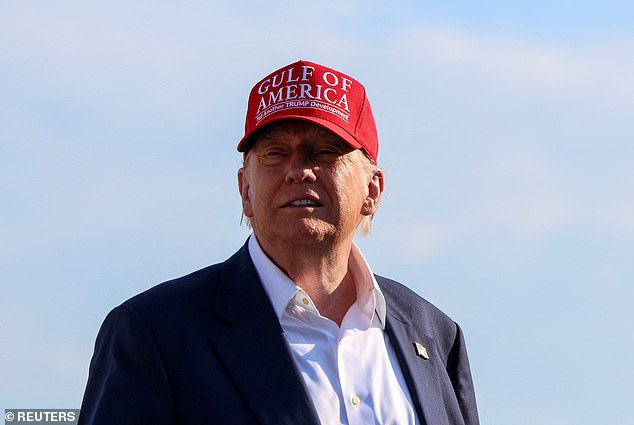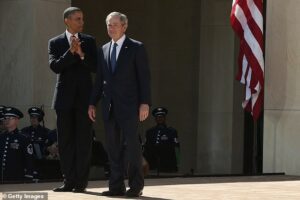
Donald Trump is demanding that there be a ceasefire between Israel and Gaza ‘sometime next week’ as he prepares to host Israeli Prime Minister Benjamin Netanyahu.
The visit next Monday will bring the two men together for the first time since the president ordered an attack on Iranian nuclear facilities.
It comes as the U.S. leader has ramped up pressure on the Israeli government to broker a ceasefire and hostage agreement and bring about an end to the war in Gaza.
Trump told reporters at the White House on Tuesday that he set a new deadline for a deal.
‘We hope [a ceasefire] is going to happen and we’re looking for it to happen sometime next week. We want to get our hostages back,’ he stated.
The president has been a strong backer of Netanyahu, ultimately lining up behind his bombing campaign against Iran – joining to confront a nation Netanyahu has long called a threat to Israel’s existence.
He also pressed Israel and Iran to agree to a ceasefire after the U.S. dropped ‘bunker buster’ bombs on Iran’s three largest nuclear facilities ‘obliterating’ their enriched uranium program.
But Trump also boiled over at Netanyahu when he concluded Israel’s continued bombing campaign in Iran was interfering with his push to bring a quick resolution to the conflict.
‘We basically have two countries that have been fighting so long and so hard that they don’t know what the f— they’re doing,’ Trump fumed before heading to the NATO summit at The Hague. ‘You understand that?’
When he finally got the two sides to relent, he dubbed it the ’12-day war.’
Netanyahu’s Minister for Strategic Affairs Ron Dermer’s trip to Washington this week for talks with senior administration officials on a Gaza ceasefire, Iran and other matters. Dermer previously served as Isreal’s ambassador to the U.S.

Trump told reporters at the White House on Tuesday that he set a new deadline for a deal
Trump immediately after taking office floated dramatic plans to ‘own and develop’ Gaza and temporarily relocate many of the estimated 2 million people who live there.
The president in public comments has signaled he’s turning his attention to bringing a close to the fighting between Israel and Hamas, since the ceasefire to end 12 days of fighting between Israel and Iran took hold a week ago.
Trump on Friday told reporters, ‘We think within the next week we’re going to get a ceasefire’ in Gaza, but didn’t offer any further explanation for his optimism.
White House press secretary Karoline Leavitt said on Monday that Trump and administration officials were in constant communication with Israeli leadership and bringing about an end to the Gaza conflict is a priority for Trump.
‘It’s heartbreaking to see the images that have come out from both Israel and Gaza throughout this war, and the president wants to see it end,’ Leavitt added. ‘He wants to save lives.’

President Donald Trump is set to host Israeli Prime Minister Benjamin Monday amid a renewed push for a Gaza ceasefire and for Hamas to release hostages
‘This has been a priority for the President since he took office, to end this brutal war in Gaza,’ Leavitt told reporters.
She also said the ‘main priority for the President also remains to bring all of the hostages home out of Gaza.’
Trump last week defended Netanyahu in his long-running legal troubles, and called for the cancellation of his trial on corruption charges.
‘It is INSANITY doing what the out-of-control prosecutors are doing to Bibi Netanyahu,’ Trump wrote, in what in the past would have been considered an unusual step into a country’s internal politics.
He then issued a threat: ‘The United States of America spends Billions of Dollar [sic] a year, far more than on any other Nation, protecting and supporting Israel. We are not going to stand for this.’

White House Press Secretary Karoline Leavitt on Monday spoke of the ‘brutal’ war in Gaza

President Trump authorized US strikes on Iran nuclear facilities while Israel was attacking Iran. Now that that conflict has settled down, there is potential to try to resolve the situation in Gaza
Two officials who were not authorized to comment publicly on the visit confirmed it, although it hasn’t been formally announced.
Trump will embrace Netanyahu as he pushes back against skeptical questions from Democratic lawmakers and others about how far U.S. and Israeli strikes have set back Iran’s nuclear program.
A preliminary report issued by the U.S. Defense Intelligence Agency, meanwhile, said the strikes did significant damage to the Fordo, Natanz and Isfahan sites, but did not totally destroy the facilities.
Rafael Grossi, head of the International Atomic Energy Agency, said on CBS’ ‘Face the Nation’ on Sunday that the three Iranian sites with ‘capabilities in terms of treatment, conversion and enrichment of uranium have been destroyed to an important degree.’ But, he added, ‘some is still standing’ and that because capabilities remain, ‘if they so wish, they will be able to start doing this again.’ He said assessing the full damage comes down to Iran allowing inspectors access.
The Washington Post in Sunday reported on intercepted conversations between senior Iranian officials following the attack who said the results were ‘less devastating than they had expected’ – in information that contradicts Trump’s own claims that the site was ‘totally obliterated.’
Trump in recent days has also inserted himself into Israeli domestic affairs, calling for charges against Netanyahu in his ongoing corruption trial to be thrown out.
Trump’s in a social media post last week condemned the trial as a ‘WITCH HUNT,’ and vowed that the United States will be the one who ‘saves’ Netanyahu from serious corruption charges.
The decision by Trump to plunge himself into one of Israel’s most heated debates has unnerved some in its political class.
Meanwhile, the Trump administration on Monday approved a new half-billion-dollar arms sale to Israel to resupply its military with bomb guidance kits for precision munitions.
The State Department said the sale is worth $510 million. It includes more than 7,000 guidance kits for two different types of Joint Direct Attack Munitions, or JDAMs.
The deal is relatively small given that the U.S. provides Israel with more than $3 billion annually in military aid. But Israel has relied on JDAMs and other related US weaponry in its war against Hamas in Gaza and its recent strikes against Iran.
‘The United States is committed to the security of Israel, and it is vital to U.S. national interests to assist Israel to develop and maintain a strong and ready self-defense capability,’ the department said in a statement. ‘This proposed sale is consistent with those objectives.’






